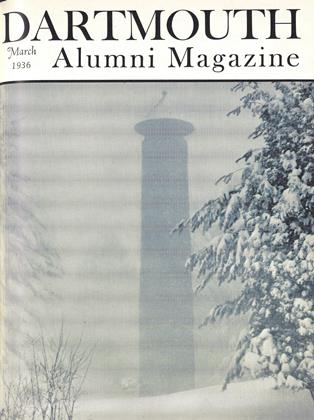NEWS OF NATT EMERSON'S death brought sorrow even to those with whom his personal acquaintance had been of the slightest. For the things that Natt accomplished during his lifetime, and his manner of accomplishing them, were such as to command admiring attention in circles extending far beyond those compassed by the intimacies of friendly association. They were, indeed, the manifest and undeniable tokens of rare practical abilities actuated by a spirit of lofty idealism. So when Natt passed out of the world it was all too evident that much of the goodness that the world needs had passed with him, and mourning followed in its wake.
To us, his classmates, Natt's death meant all of that and more. Ours was the grief occasioned by the loss of a dear companion, ours the uprush of sympathy for a singularly united family suddenly bereft. But overshadowing these emotions was, and still is, a feeling of almost desolate bewilderment. It is not leadership of which we have been deprived; for as time passes and the members of a college class scatter more widely on the errands imposed by Fate, they must find their individual ways beyond the outposts of the future. Something far more precious has been taken from us—our reliance upon the safeguardianship of the lines of communication with our collegiate past, its comradeships, its memories, its ties of fealty lightly spun in youth but grown stronger with the increase of our years.
Natt Emerson stood for us as the personification of that safeguardianship, as the presiding genius of a mystical abode in which, by some strange alchemy of the imagination, each one of us sensed, and was wont to seek, the sheltering attributes of his boyhood home. No one other than he could have created and maintained an illusion at once so fantastic and so satisfying. But by that very sign, as the inscrutably appointed hour approached and Natt fell peacefully on sleep, we knew that the long-cherished fire had crumbled to grey ashes on the hearth, and the light in the window had gone out. If now there be compensation for our loneliness it must abide in a quickened realization of our unredeemable indebtedness to Natt, a deeper understanding of the nobility of service as it was exemplified in his manifold undertakings in our behalf and in behalf of the college that he loved.
Much of what this quiet, steadfast man achieved for others has already been disclosed in the published records of his life. The more intimate and poignant record of the material distresses that he was instrumental in alleviating, the mental and spiritual conflicts that he helped to assuage, he kept locked in the most secret chamber of his heart, where it shall repose forever unrevealed. But at this moment, after all, it is not the story of Natt's particular deeds that we his classmates would rehearse. Instead we grope for words to voice something of what Natt signified to us, something of the heartache that is ours because he has gone from us. But alas, the thoughts that lie too deep for tears elude the pattern of appropriate phrases. Grief's sincerest and most eloquent tribute is the bowed head—and silence.
In Behalf of the Class of 1900
 View Full Issue
View Full Issue
More From This Issue
-
 Article
ArticleCURRICULUM VIVENS
March 1936 By E. Gordon Bill -
 Article
ArticleHANOVER BROWSING
March 1936 By Herbert F. West '22 -
 Class Notes
Class NotesClass of 1911
March 1936 By Nathaniel G. Burleigh -
 Class Notes
Class NotesClass of 1910
March 1936 By Harold P. Hinman -
 Article
ArticleAbout Twenty-Five Years Ago
March 1936 By Warde Wilkins '13 -
 Class Notes
Class NotesClass of 1928
March 1936 By LeRoy C. Milliken
Homer Eaton Keyes '00
-
 Article
ArticleNo Award for Prize Song
February, 1911 By EDWARD K. WOODWORTH '97, HOMER EATON KEYES '00, HARRY R. WELLMAN, 1 more ... -
 Article
ArticleTHE NEW FOOTBALL
DECEMBER, 1906 By Homer Eaton Keyes '00 -
 Article
ArticleDARTMOUTH OF THE FUTURE
July 1920 By HOMER EATON KEYES '00 -
 Article
ArticlePURE DEMOCRACY AND THE COLLEGES
January 1922 By HOMER EATON KEYES '00 -
 Article
ArticleTHE PLOWMAN ETCHINGS
December, 1922 By HOMER EATON KEYES '00







